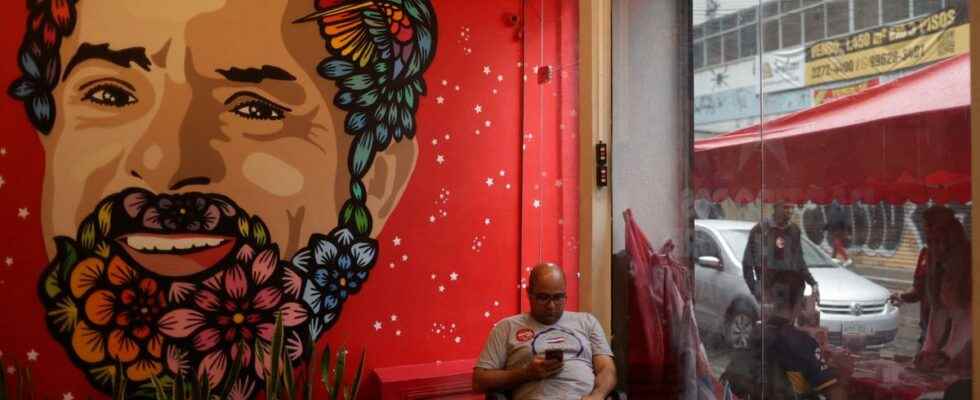The voters of the left-wing ex-president, seeking a new mandate twelve years after leaving power, sing the classics of popular and Afro-Brazilian origin to show their support for his candidacy.
In Pedra do Sal, the cradle of samba in Rio de Janeiro, the chant “Ole, Ola, Lula” resounds in the night, bodies sway and flags, t-shirts and caps displaying the face of the ex- leftist president are everywhere. It is unlikely that a voter of far-right incumbent President Jair Bolsonaro, Luiz Inacio Lula da Silva’s main rival for Sunday’s poll in Brazil, will venture into this place where progressive youth meet to sing songs. classics of popular and Afro-Brazilian origin.
“Samba is a way of resisting oppression, it’s the voice of the people. And Lula represents the peoplesays Karen Gama, a 24-year-old black woman who came to dance, Workers’ Party (PT) candidate stickers on her chest and on each buttock. In this ultra-polarized election, the former left-wing head of state (2003-2010) is seeking a third term, twelve years after leaving power. For one of his last meetings before the first round, Lula had chosen last weekend to go to a large traditional samba school, Portela. Thousands of people dressed in red – the color of the PT – crowded there to listen to the former steelworker and give him an ovation.
Read alsoBrazil election: Bolsonaro retains market support
Pragmatism
“Coming here, he returns to his basePopular, says Joao Diamante, from a favela in Rio, who came to support the ex-president. Now a chef, he says he was able to study gastronomy thanks to scholarships set up when Lula was in power to allow young people from the working classes to access university. “Portela is the temple of samba. We came here to acclaim the only president who has valued us, us blacks and minorities. We were extremely attacked during Bolsonaro’s mandate“, told AFP Douglas Williams, 30, nurse, an LGBT pennant in the hair.
Despite its origins, samba hasn’t always been associated with leftist ideas, says Wagner Pralon Mancuso, professor of political science at the University of São Paulo. “There are very well-known sambas that exalt Brazil during the military dictatorship(1964-1985), he says. More recently, several samba schools in Rio lent their support to Marcelo Crivella, an evangelical right-wing pastor, during his campaign to run for mayor of Rio in 2016.”Schools are pragmatic because they depend on public fundsexplains Marco Teixeira, political science expert from the Getulio Vargas Foundation.
“political tool”
“Today, schools remember that Lula’s governments supported cultural events“says professor at Veiga de Almeida University Guilherme Guaral, who has studied the links between politics and samba. Believing themselves to be on conquered land, a group playing in the chic Barra da Tijuca district took to the stage in mid-September in a popular song at samba evenings, the lyrics of which, modified, called for the return of Lula to the head of the country. But the band got booed and had to leave the stage. “Art is an essential political tool in our democracy, and samba is inherently political“, defended the group Samba Independente dos Bons Costumes (“Samba independent of good customs”) in a response posted on Instagram. “In other words, much more than a musical genre, the samba is an instrument of socio-political change.“.
Read alsoIn Brazil, Lula and Bolsonaro each draw their cultural support
Claudio Cruz, the owner of a bar in the center of Rio, shares this opinion. “Samba has always been a form of resistance to inequalities, so it is more than normal that today the world of samba supports Lula“, he told AFP. A big fan of the former president, Mr. Cruz even went so far as to install a helium-inflated figure of his effigy about ten meters high on the sidewalk in front of his establishment on the occasion of the thirteenth anniversary from his bar last week. Behind this gigantic Lula resounded Apesar de você (Despite you) by Brazilian icon Chico Buarque, a dictatorship-era song that anticipates the joy of the people after the end of military rule.
